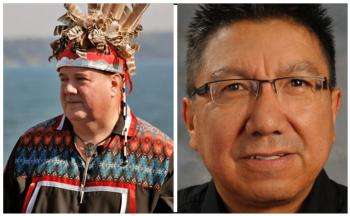Image Caption
Summary
Local Journalism Initiative Reporter
Windspeaker.com
UPDATED: Feb. 10, 2021 11:40 a.m.
Policing discrepancies on First Nations have always been there, but the coronavirus pandemic has underscored those inequities.
“Bylaw enforcement is also another important piece that we’re trying to focus on, especially in light of the pandemic we currently find ourselves in,” said Nishnawbe Aski Nation Grand Chief Alvin Fiddler. “And the need to have some mechanisms to enforce bylaws that many of our communities have in place to protect their membership, their citizens, their communities.”
Fiddler holds the justice portfolio for the Chiefs of Ontario. He spoke to chiefs during COO’s Special Chiefs Assembly on Feb. 4.
“So many issues (are) sort of layered in this file,” he said.
Highlighted was the difficulty experienced by many First Nations that don’t have their own police forces in having their bylaws or band council resolutions enforced when measures were put in place to combat the spread of COVID-19 in their communities.
Concerns go beyond this, though, said Sarah-Grace Ross, COO director on the justice file. COO is working with both the Assembly of First Nations on federal policing legislation and on a collaborative table with the federal and Ontario governments to look at issues around the enforcement of First Nations laws and make recommendations on how to resolve or improve those issues.
The collaborative table on First Nations laws is in its early stages and sees Ross serving as one of three co-chairs. Ross, who represents COO, is joined by a representative from the federal department of justice and the provincial attorney general’s office.
“Another part of the scope (of this work) is to make sure the solutions are helpful but not mandatory, or force solutions for any communities that that solution doesn’t work for. The circumstances for why enforcement is a problem, it’s going to vary from community to community and the table’s goal will be to cover those gaps but not to implement solutions that won’t work,” said Ross.
“The broader goal of the table isn’t just to look at COVID-related laws. That’s what has brought us all to the table. But the goal is really to look long term and look at self-determination and inherent jurisdiction and, regardless of the source of a law, what are the issues for enforcement to make sure that we don’t keep encountering this issue,” said Ross.
It’s not just bylaws that need to be enforced, she said, but any First Nations law, including laws of inherent jurisdiction and land management laws.
The federal government provided the AFN with $1.5 million in the fall to look at a new model for policing. The purpose of the reform is to have First Nations policing designated as an essential service and have funding principles mandated.
Presently, First Nations police services operate under the First Nations Policing Policy, which was established in 1991. The FNPP is a discretionary transfer payment program.
The AFN has asked COO for its input, which includes listing priorities and needs for what policing legislation should contain from an Ontario perspective based on the existing models and provincial legislation. This is the first step, said Ross, which will be followed by the AFN assembling a task force with policing technicians from all regions of the country.
However, there is an issue in working with AFN, she said, pointing out that while AFN promotes co-development of legislation, a resolution passed by COO in 2019 rejects that approach.
“The task before us is to respect the parameters of the resolution, but also make sure that the complexity and the size and the needs of First Nations in Ontario are heard by the AFN as they start their work,” said Ross.
She said that COO would remain engaged with AFN for the first step to ensure Ontario’s needs and concerns are understood by AFN. However, work would not go further without COO revisiting the 2019 resolution opposed to co-development of legislation.
Also taking place are discussions around CSPA regulations.
Ross said discussions that are at this table include advocating for better CSPA engagements to ensure First Nations have “good regulations for policing in Ontario” and also advocating for more avenues to raise issues regarding operational problems with funding, wage parity, and benefit packages for First Nations police services.
“Another part of the scope (of this work) is to make sure the solutions are helpful but not mandatory, or force solutions for any communities that that solution doesn’t work for. The circumstances for why enforcement is a problem, it’s going to vary from community to community and the table’s goal will be to cover those gaps but not to implement solutions that won’t work,” said Ross.
Fiddler said that Nishnawbe Aski Police Service (NAPS) began talks with the province four years ago.
“We reached out to the province that we need to create a process that would lead to our police service becoming designated as an essential service, that we need to move away from this program-based policing model that all of us have been struggling with since early ‘90s,” said Fiddler.
NAPS was created in 1994 and serves 35 communities in northern Ontario. It is one of nine First Nations police forces in Ontario.
As far as Mohawks of Bay of Quinte Chief R. Donald Maracle is concerned the talk tables are set up to transfer the Crown’s liability and responsibility to another organization so the Crown can continue to discretionary funding to the FNPP.
“There’s no statutory requirement on the part of the Crown to fund policing. And so the whole relationship issue has to be sorted out for what are they liable. We can exert sovereignty and jurisdiction but with that’s going to come a price tag and where are we going to get the money? We can’t just presume the Crown is going to accept that. Maybe they’re not,” said Maracle.
Local Journalism Initiative Reporters are supported by a financial contribution made by the Government of Canada.

